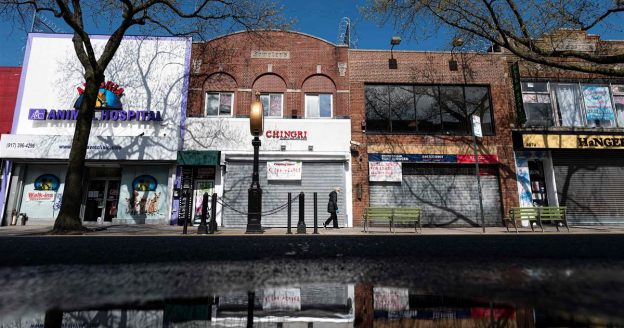One of the main coronavirus relief fund sources for suffering small businesses hit its $350 billion limit Thursday and is no longer accepting any more lenders or applications, the Small Business Administration announced.
“The SBA is currently unable to accept new applications for the Paycheck Protection Program based on available appropriations funding,” SBA spokesperson Jennifer Kelly said in a statement. “Similarly, we are unable to enroll new PPP lenders at this time.”
The SBA approved 1,661,397 loans from 4,975 lenders before it was exhausted. Due to bottleneck issues between the agency and banks, only a fraction of those have actually been credited to customers’ bank accounts.
The emergency fund offered a lifeline to small businesses with fewer than 500 employees, providing loans that turn into grants if used to cover payrolls and avoid layoffs. The hastily constructed program has been bedeviled with administrative issues since its launch less than two weeks ago, with the SBA’s loan system crashing under the demand and the nation’s largest lenders reduced to manually pushing through a trickle of applicants at a time.
Let our news meet your inbox. The news and stories that matters, delivered weekday mornings.
The depletion of the fund’s resources had been expected for several days, and is set to launch a battle between Democratic and Republican lawmakers over the shape of additional relief funding.
After Secretary of the Treasury Steven Mnuchin asked Congress for an additional $250 billion funding, the Republican-led effort ended in an impasse as Democrats balked at authorizing additional funds without adding protections for more vulnerable borrowers, such as minority- and women-owned businesses.
Download the NBC News app for full coverage of the coronavirus outbreak
President Donald Trump attacked House Speaker Nancy Pelosi, D-Calif., on Thursday over the logjam, one day after threatening to adjourn Congress. A “pro forma” session in the Senate scheduled for the afternoon Thursday looks unlikely to resolve the divide.
The PPP loan program was well intended but had a “structural flaw” in how it was executed, said Mehrsa Baradaran, a professor specializing in banking law at the University of California, Irvine.
“Any time you create a big program and give banks the ability to choose which customers to prioritize, you’re going to have disparities. Banks are incentivized to choose the customers that make them the most money,” she said.
Major banks did not immediately respond to requests for comment.
Small business owners have a few options now that the fund is dry. If a business owner has applied but hasn’t been approved, they should keep working with their lender to make sure all paperwork is ready in the event the fund is replenished, said James Brower, a partner at the Marks Paneth accounting and advisory firm.
In the meantime, business owners can look around for local and state grants. Anyone who has already been approved by the SBA should make sure their bank deposits the earmarked funds.
Business owners who have not yet applied for the program can still indicate their interest with their bank, if the portal is still open. Some owners have reportedly tried applying with multiple banks, and then accepting whichever offer comes through.
Owners have reported better luck getting funding when working with local community banks with whom they already have a relationship, than through a large retail bank.



Comments are closed